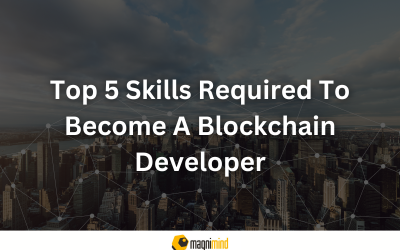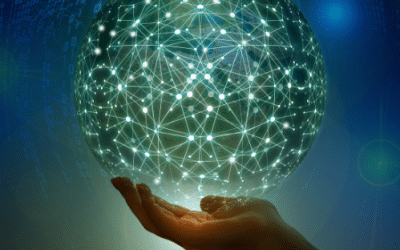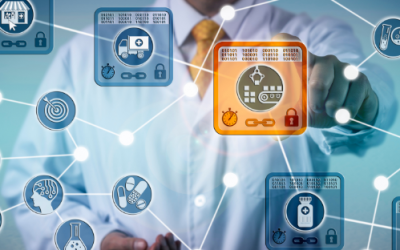AI and Blockchain are cutting-edge technologies revamping the world in recent years. Artificial intelligence refers to the emulation of human intelligence in machines. It involves developing algorithms that enable machines to perform human-like functions like perception, decision-making, and problem-solving. AI has recently sparked public interest with the release of tools like Chat Gpt and Midjourney AI. Blockchain is a secure and transparent database management system that has transformed the way we store and exchange data.
The convergence of AI and blockchain holds tremendous potential for groundbreaking advancements across various industries. By combining the intelligence of AI with the secure and decentralized nature of blockchain, new possibilities can be unlocked and innovations can be driven in industrial and daily life operations.
While AI faces challenges related to transparency and trust, blockchain can serve as a powerful tool to address these concerns. The immutable nature of blockchain’s digital records and its decentralized data storage provide a transparent and accountable framework for AI systems. By leveraging the capabilities of blockchain, stakeholders can gain insights into the decision-making process of AI algorithms and verify the integrity of the underlying data, thereby enhancing trust and facilitating explainable AI.
Moreover, the interplay between AI and blockchain extends beyond transparency and accountability. The integration of these technologies opens up new avenues for augmentation and automation. AI brings intelligence to blockchain-based networks, enabling comprehensive data analysis and actionable insights. Through automation, AI and blockchain streamline business processes, reducing friction and increasing efficiency. This seamless collaboration empowers individuals, fosters a transparent data economy, and drives the adoption of decentralized solutions.
As the intersection of AI and blockchain is delved into, the profound impact of their synergy is uncovered. A glimpse into their transformative potential is offered by the real-world use cases and interdependencies between these technologies. Through the exploration of this dynamic landscape, further exploration and innovation are sought to be inspired, ultimately harnessing the full power of the AI-blockchain relationship.
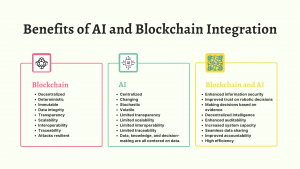
The intersection of these two technologies can bring various advancements in industrial and daily life operations. In this blog post, we will see how these two technologies together are making innovations.
AI and Blockchain Reshape Cybersecurity
AI and Blockchain together can reshape the current landscape of cybersecurity. AI can be employed in cybersecurity to detect and respond to potential threats thousands of times faster than humans. AI can spot security breaches and remove them promptly.
Blockchain can be used as a highly encrypted ledger platform to store data in a decentralized manner, allowing only authorized people to access it. Integrated with AI, Blockchain can decentralize and secure data collected by AI to enhance data privacy and safety.
With blockchain technology, all the data, variables, and processes AIs use to make decisions will be recorded in immutable records that can’t be changed. This will make it easier to audit the whole process. Real-world examples include Blackbox AI using Blockchain and machine learning to automate and speed up the construction industry’s workflow, management, and verification processes.
Supply Chain
AI and Blockchain can help improve transparency in the supply chain by allowing the tracing of products and product conditions. This prevents intermediaries from tampering with a product and improves trust among agencies. Similarly, any faulty or error during the process can be tracked and resolved timely.
AI and Blockchain allow companies to digitize physical assets and create transparent, immutable, and unalterable records. This improves management, provides greater visibility, and prevents fraud and errors. AI’s machine learning processes are crucial to supply chain management as they allow companies to forecast inventory, consumer demand, and supply chain.
Furthermore, integrating IoT (Internet of Things) with AI and blockchain can further enhance supply chain visibility. By placing IoT sensors on goods, companies can monitor their condition throughout the transportation process, and this data can be securely recorded on the blockchain. This integration allows manufacturers, freight forwarders, and port operators to have real-time insights into the movement and conditions of goods, leading to more informed decision-making and improved efficiency.
The DHL Global Trade Barometer is an example of AI and Blockchain-equipped supply chains.
Benefits of AI and Blockchain to Financial Systems
AI and Blockchain provide several solutions to the challenges faced by financial systems, providing enhanced security, improved customer service, and efficient transaction processing.
Blockchain secures transactional records by storing information in an unalterable, decentralized database visible to every network member, thus ensuring transparency and safety. A blockchain network can only be accessed with special keys. This allows only authorized people to access the information. Any attempt to tamper with the records requires authorization from all network members. AI integrated into financial systems can further improve this security by detecting real-time fraud and suspicious activities and notifying users and administration.
Blockchain and AI can be implemented to provide better customer services to clients. Various services can be automated using these technologies. Blockchain can store clients’ data securely, and AI can analyze the information and make unbiased decisions. Customer assistant chatbots are examples of such applications.
Blockchain technology has already made the traditional slow money transfer through banks much faster, cheaper, and more efficient by reducing intermediaries. AI can further enhance such systems by automating payments. With the advancements in natural language processing models, AI-powered voice assistants can facilitate payments, making transactions more convenient and accessible.
Additionally, in the realm of cryptocurrencies, AI can play a significant role in improving trading strategies and market analysis. By utilizing AI and natural language processing techniques, sentiment analysis can be conducted to gauge market sentiments towards cryptocurrencies. This analysis can help traders make informed investment decisions based on the overall positive or negative sentiment.
AI can also assist in obtaining relevant and clean data for cryptocurrency trading, allowing traders to create effective strategies. Furthermore, the integration of AI and blockchain can enable fully automated trading strategies, leveraging the speed and accuracy of AI algorithms to execute trades swiftly and profitably.
Privacy protection is another aspect where blockchain and AI complement each other. The cryptographic techniques employed in blockchain technology enhance privacy throughout the network, ensuring secure AI training and operations. Robust privacy systems enable the training and deployment of competitive and complex AI models while safeguarding sensitive data.
Healthcare
Blockchain and Artificial Intelligence are also significant in the field of healthcare. AI can rapidly perform complex computational operations and analyze large data sets without bias. Blockchain can help store medical records securely. It can improve the current EHR(electronic health record) measures by improving security and transparency. EHR software like Epic also uses artificial intelligence to predict hospital admissions, detect patient risk levels, etc.
AI-based technologies can also allow faster identification and diagnosis of a disease. Automated robots as assistants can make surgical processes much faster and more efficient. AI-based systems can also provide personalized medicine and treatment to patients.
Combination of AI and Blockchain provide a holistic approach to patient data management. This combination enables to create platforms that allows patients to securely store and control their health records while granting access to healthcare professionals for research purposes. This technology facilitates data sharing while maintaining patient privacy.
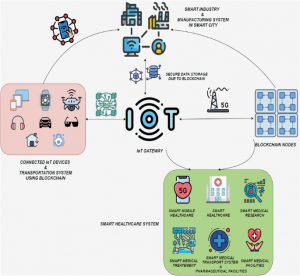
Agriculture
AI and Blockchain-based technologies also provide innovative solutions in agriculture. AI can track the growth of weeds and diseases caused by pests etc., with the help of sensors. AI can also analyze soil conditions, agriculture land appropriateness, crop timings, and other things to help farmers make better decisions.
Moreover, the integration of IoT, AI, and blockchain in agriculture enables the concept of smart farming, facilitating efficient tracking of logistics and enhancing operational processes. An exemplary application of AI and blockchain in the agricultural industry is AgrBlockIoT’s Agr-Food supply chain management solution solution, which leverages these technologies to ensure transparency and traceability.
Furthermore, the combination of AI and blockchain is highlighted for tackling challenges such as drought, desertification, pollution, and soil erosion. By embracing good agricultural practices (GAP) that prioritize food safety and sustainability, farmers can effectively manage agronomy at the field level. This includes leveraging advanced ground-based and remote sensing technologies to observe, measure, and respond to changing conditions, ultimately optimizing crop production.
Remote sensing satellites play a crucial role in agriculture by capturing high-resolution data. Through the analysis of this data, vegetation indices are derived, enabling the monitoring of changes in vegetation cover and the tracking of plant phenology. AI algorithms further contribute to agronomy management by enabling crop production forecasting, assessing crop damage, detecting nutrient deficiencies, monitoring droughts, and identifying pests and diseases.
In addition to agronomy, blockchain technology finds its application in agriculture supply chains to enhance transparency, traceability, and efficiency. By integrating blockchain with multi-agent systems (MAS), transaction costs can be reduced, logistics can be optimized, and food safety protocols can be improved. Blockchain ensures secure and transparent information management throughout the food production process, enabling traceability from seed to the final food product and improving overall supply chain efficiency.
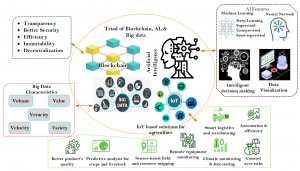
Intellectual Property Ownership Protection:
Protecting intellectual property rights is another area where AI and Blockchain have proposed remarkable solutions. Blockchain provides an immutable ledger to track and trace a physical or digital product as ownership changes hands. There is a complete record of the chronologic history of a product, and no one can alter the records. Thus Blockchain provides transparency and privacy and makes it impossible for anyone to plagiarize someone’s content.
AI also has numerous benefits in this regard. For example, scanning billions of web pages in seconds to see if the content is plagiarized. Moreover, artificial intelligence can quickly detect and steal intellectual property or copyright infringement and notify the users.
An example is IPwe, the world’s first AI and blockchain-powered global patent registry that solves the problems like inaccurate data, outdated ownership records, and lack of transparency in the IP ecosystem.
Another example is MediChain, a healthcare-focused blockchain platform that leverages AI for intellectual property protection. MediChain enables medical professionals and researchers to securely store and share sensitive health data while maintaining control over their intellectual property. Through AI-powered algorithms, MediChain can detect and prevent unauthorized access to medical data, ensuring privacy and protecting intellectual property rights.
Conclusion
The convergence of AI and Blockchain is reshaping various industries by improving security, transparency, and efficiency.
Cybersecurity is strengthened by AI’s rapid threat detection and Blockchain’s immutable ledger. Traceability and fraud prevention has improved supply chain management. AI and Blockchain provide transparency and rapid threat detection in financial systems. Healthcare sees advancements in personalized medicine and secures patient records. Agriculture and Intellectual property protection also benefit from these technologies.
In short, integrating Blockchain and AI opens up transformative innovations across sectors.
. . .
To learn more about variance and bias, click here and read our another article.
Ref_figure_healthcare:
Rajawat, A.S., Bedi, P., Goyal, S.B., Shaw, R.N., Ghosh, A., Aggarwal, S. (2022). AI and Blockchain for Healthcare Data Security in Smart Cities. In: Piuri, V., Shaw, R.N., Ghosh, A., Islam, R. (eds) AI and IoT for Smart City Applications. Studies in Computational Intelligence, vol 1002. Springer, Singapore. https://doi.org/10.1007/978-981-16-7498-3_12
Ref_figure_agriculture:
Bhat, Showkat & Huang, Nen-Fu & Bashir, Ishfaq & Sultan, Muhammad. (2022). Agriculture-Food Supply Chain Management Based on Blockchain and IoT: A Narrative on Enterprise Blockchain Interoperability. Agriculture. 12. 40. 10.3390/agriculture12010040.

